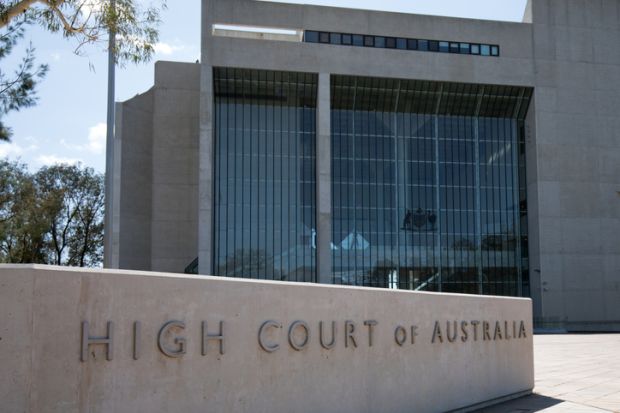Dissident professor Peter Ridd’s unsuccessful High Court challenge against his sacking will nevertheless reinforce legal protections of academic freedom, according to constitutional lawyer George Williams.
Professor Williams said the court had delivered a surprisingly “robust” protection of intellectual freedom that could influence future legislation and would shape judicial treatment of the “model code” for protecting academic expression on campuses.
“This gives us a sense of how the court would interpret key terms in the code,” said Professor Williams, deputy vice-chancellor of UNSW Sydney. “[It] would take a broad and protective approach in what it sees as being protected by terms like ‘academic freedom’.
“If the code came to court, you’d have a court that would interpret it with a sympathetic understanding of the value of academic freedom within universities. That’s really significant, because if you had a court that wasn’t sympathetic, you could have a code that was just rendered ineffective.”
Dr Ridd took legal action when James Cook University (JCU) disciplined and eventually dismissed him, in a dispute triggered by his criticism of the university’s coral reef research. In 2019, a Federal Court found that JCU had acted unlawfully and ordered it to pay him more than A$1.2 million (£647,000) in compensation and “pecuniary” costs.
But the full Federal Court overturned the decision in 2020, in a judgment that has now been upheld by the top court in the land.
The High Court found that early disciplinary actions against Dr Ridd had been unjustified because he had been exercising legitimate rights to academic freedom, but subsequent sanctions and his eventual dismissal had been justified by his breach of confidentiality obligations.
The court dismissed his appeal without ordering costs because his proceedings had been conducted on an “all-or-nothing basis”.
The National Tertiary Education Union said the court had endorsed the key principles of academic and intellectual freedom. “JCU should never have taken disciplinary action against Dr Ridd in the first place,” said general secretary Matthew McGowan. “It is disappointing Dr Ridd had to take this matter to the High Court for this to be reinforced.”
The judgment was delivered on the same day that the education minister, Alan Tudge, announced that all Australian universities were now aligned with the model code, which was drafted in 2019 by former High Court chief justice Robert French.
Mr Tudge said the court had endorsed the “long-standing core meaning of intellectual freedom” by quoting English philosopher John Stuart Mill. The judgment says that while prohibiting “discourteous conduct” might help deliver “peace in the intellectual world”, such “intellectual pacification” could entail “the sacrifice of the entire moral courage of the human mind”.
Mr Tudge said he would seek further advice on the implications of the Ridd case. “Employment conditions should never be allowed to have a chilling effect on free speech or academic freedom at our universities,” he said.
Professor Williams said the decision did not mean that universities could sidestep intellectual freedom obligations by imposing confidentiality requirements in a “willy-nilly” fashion. “The code would require the clauses to be well drafted, proportionate, necessary. If you were just trying to muzzle someone, it wouldn’t be justified under the code. I don’t think the court would accept that, either.”
He said the language used in the judgment was significant, with courts only rarely citing “academic intellectual sources” such as Mill. “They’re saying intellectual freedom includes offending your colleagues – that’s a first. There was no certainty the court would go in this direction.
“It’s a really significant decision that will set out an understanding of communication and speech within universities, that you’d expect to play out in all sorts of contexts.”
Register to continue
Why register?
- Registration is free and only takes a moment
- Once registered, you can read 3 articles a month
- Sign up for our newsletter
Subscribe
Or subscribe for unlimited access to:
- Unlimited access to news, views, insights & reviews
- Digital editions
- Digital access to THE’s university and college rankings analysis
Already registered or a current subscriber? Login












